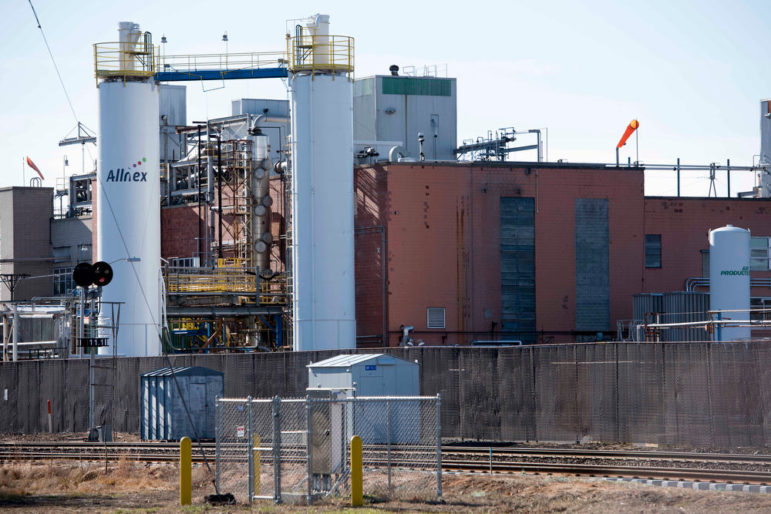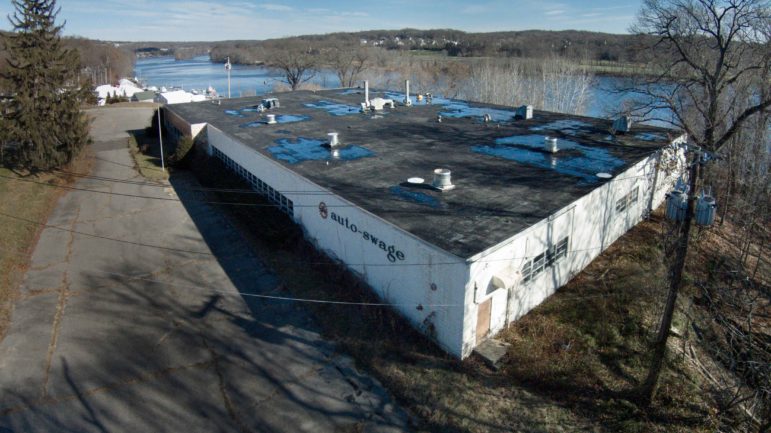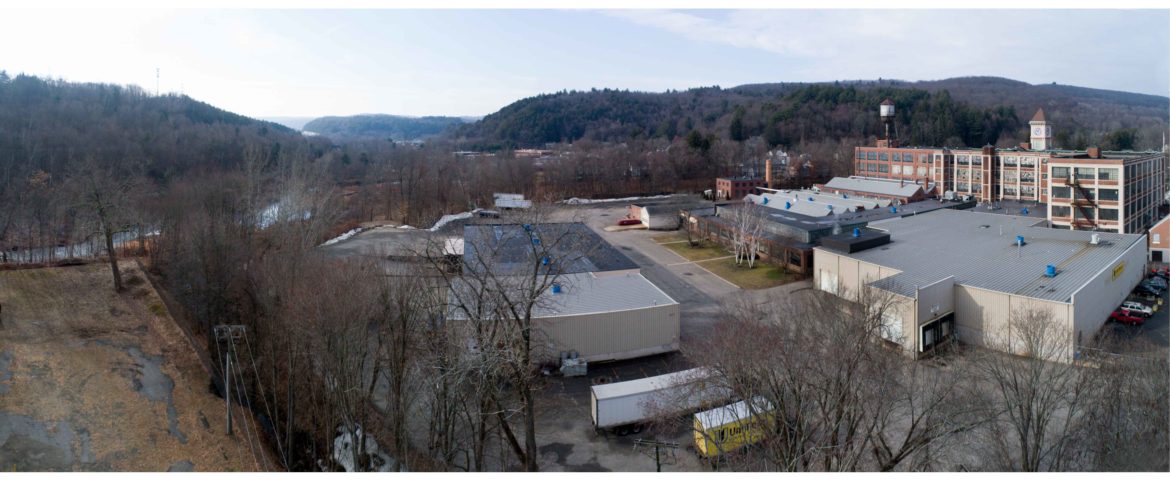Nearly half of the 60 companies that are allowed to discharge wastewater directly into Connecticut’s rivers, brooks and other bodies of water exceeded the amounts of toxic metals or other pollutants that their permits allowed over the last three years, a C-HIT analysis of federal data shows.
Despite the violations, the state Department of Energy & Environmental Protection (DEEP) fined only two of the 29 companies found to be in noncompliance with their permits—a record that state environmental advocates called alarming, but that the agency said is justified.
The 29 companies discharged excessive amounts of pollutants during at least one three-month period from October 2013 to September 2016. At least 19 companies exceeded by more than 100 percent the amounts they were allowed to discharge, according to the U.S. Environmental Protection Agency (EPA) data.
The data also show that 23 of the 60 companies were found in noncompliance with terms of their permits for at least half of the three years—for reasons ranging from excessive discharges to submitting late discharge reports. Thirteen companies were found in significant noncompliance—the most serious level of violation—for three months or more.
While DEEP has the authority to fine or take court action against polluters, EPA records show it more commonly issues notices of violation or noncompliance or warning notices, opting to work with violators for months or years to correct the problems.
Oswald Inglese, DEEP’s director of water permitting and enforcement, said that while the agency receives and generates a large volume of compliance monitoring information monthly, reviewing all the information with limited resources “far exceeds the capacity of department staff.”
Only two companies, Allnex USA of Wallingford and ReEnergy Sterling, were fined for violations of their National Pollutant Discharge Elimination System (NPDES) permits over the three-year period. DEEP levied a $52,000 fine in 2014 against Allnex, which discharges into the Quinnipiac River, and a $45,000 fine in 2014 against ReEnergy Sterling, which discharged into the Moosup River.
State environmental groups say DEEP needs stronger enforcement instead of allowing companies to remain in noncompliance for months or years. The groups say DEEP should fine companies immediately. The lax enforcement, the groups say, results in the pollution of some of the state’s most popular waterways, such as the Connecticut, Naugatuck, Housatonic, Thames and Quinnipiac rivers.
“The record of noncompliance with NPDES permits in Connecticut is extremely disturbing,” said Margaret Miner, executive director of Rivers Alliance of Connecticut. “While some of the violations are undoubtedly minor, some are serious, and all deserve scrutiny.”
“Personally, I think if companies are blatantly and maliciously disobeying the law, they should face consequences, regardless of what the state’s budget situation is,” said Rep. James M. Albis, D-East Haven, the House deputy majority leader. “The reality is that we need enforcement and compliance staff to ensure that this is happening, and in difficult budget times, these types of staff tend to be on the chopping block, or positions are not filled after retirements.”
Inglese said the agency uses computer algorithms to determine which companies are in significant noncompliance and then investigates whether an enforcement response is warranted. The agency often works with violators to determine why they are noncompliant and to get them into compliance.
“Any violation is grounds for enforcement action, but that does not mean that all noncompliance is immediately actionable or always subject to formal enforcement and penalties,” Inglese said.
Companies found in noncompliance for many months or years are not automatic candidates for fines, he added. “Case-by-case circumstances vary and must be evaluated based on their specific situations.”
He said companies may be noncompliant while implementing “a long-term plan to reduce or eliminate noncompliance,” or because of an error on a permit application or “external impediments” beyond their control. Some companies have been involved in bankruptcy proceedings or facility shutdowns that leave behind unresolved environmental problems, he said.
DEEP’s enforcement response “is primarily focused on occurrences of significant noncompliance,” Inglese said. “Those that are not considered significant noncompliance are recorded and noted for further evaluation and possible action at any time in the future.”
The federal Clean Water Act prohibits companies except those holding NPDES permits from directly discharging pollutants through a “point source”—such as a pipe, ditch, channel or tunnel—into a body of water.

Vern Williams Photo.
Allnex of Wallingford was fined $52,000 for violations of its wastewater permit in 2014.
The permits limit what kinds of materials can be discharged and their amounts, and set monitoring and reporting requirements to ensure that the discharge does not contaminate the water and impact public health. Industrial permit holders are required to self-report discharge data monthly to DEEP, which provides the data to the EPA. The EPA segments the data quarterly so that noncompliance in a single month is reflected as noncompliance for an entire quarter.
Under the Clean Water Act, any noncompliance is considered a violation and grounds for enforcement or loss of a permit.
Four industrial permit holders—Connecticut Galvanizing of Glastonbury, UniMetal Surface Finishing in Thomaston, Plainfield Renewable Energy in Plainfield and the U.S. Navy’s submarine base in Groton—were found in noncompliance every quarter from October 2013 to September 2016, the data show. None were fined by DEEP.
Connecticut Galvanizing, which discharges into the wetlands of Hubbard and Salmon brooks, was issued a violation notice in 2012 and two more in 2014, Inglese said. By mid-2014, DEEP “escalated the matter into a mediation effort between Connecticut Galvanizing and other involved parties” to allow the company to install a storm water treatment system required by its permit, he said.
In all of 2015 and 2016, Connecticut Galvanizing discharged much more copper, lead and zinc than its permit allowed, but it was not issued a violation notice. In late 2015, for example, the company discharged storm water runoff into Salmon Brook that contained 223,000 percent more zinc and 1,980 percent more lead than allowed.
“All parties were aware of Connecticut Galvanizing’s noncompliance, so the issuance of further notices of violation was viewed as redundant,” Inglese said.
Connecticut Galvanizing paid a $45,000 fine to the federal government and nearly $150,000 to the Farmington River Watershed Association to settle a lawsuit brought by the Environment Connecticut and Toxins Action Network, under the Clean Water Act in October 2016.
Connecticut Galvanizing did not respond to requests for comment.
UniMetal, a metal finisher of parts for the aerospace, automotive and other industries, was in significant noncompliance in 2016, according to the EPA data. The company discharged 293 percent more cyanide, 40 percent more copper and 16 percent more nitrogen into the Naugatuck River than its permit allows.
Two DEEP violation notices remain open in that case, Inglese said. The company hired technical consultants to determine the cause of the noncompliance and is undergoing a toxicity identification and reduction evaluation, he said.
UniMetal President George LaCapra Jr. said the company “has a long history of being a responsible steward of the community and highly respects the waters of Connecticut.”
He said the company is cooperating with DEEP “on how to best meet our current and future NPDES permit obligations.”
Plainfield Renewable Energy, which discharged into the Quinebaug River, was issued two violation notices in 2014 “for sampling and reporting errors and multiple effluent violations” in 2013 and 2014, Inglese said. The noncompliance has since been resolved.
Plainfield Renewable Energy was “a distressed asset,” and most of its violations occurred before it was purchased in July 2015 by Greenleaf Power, said Matt Ross, a spokesman for Greenleaf Power, which owns and operates biomass facilities in the United States and Canada.
Since taking over operations, there have been only four minor permit issues, Ross said. “All issues have been reported and addressed, and, in each case, did not rise to the level of regulatory enforcement,” he said.
The Navy submarine base in Groton had multiple effluent violations and discharged oil and grease far above its permitted limits into the Thames River. The submarine base discharged 100 percent more oil and grease in July-September 2016, and 690 percent more oil and grease in July-September 2015.
The submarine base did not immediately respond to repeated requests for comment. On April 6, Chris Zendan, public affairs officer, wrote in an e-mail, “As CT DEEP noted, case-by-case circumstances, related to an activity’s noncompliance for many months or years, can vary and must be evaluated based on their specific situations. The base is dedicated to being a good steward of the environment and works diligently with the EPA and CT DEEP to that end.”
He wrote, “In this effluent case…SUBASE believes the findings may be in error and has been investigating the issue with DEEP since late 2015.”
Eight companies were found in noncompliance in 10 to 12 quarters from October 2013 to September 2016, the data show. Shelton-based Autoswage Products, for example, was found in noncompliance in 10 quarters, including the last quarter of 2013, when it discharged 517 percent more copper and 58 percent more iron into the Housatonic River than its permit allowed.

Vern Williams Photo.
Autoswage of Shelton discharged more copper and iron into the Housatonic River than allowed in 2013. It no longer has a discharge permit.
Autoswage President Keith Brenton said the company, which manufactures contact and connector pins, recently emerged from bankruptcy and has no plans to discharge wastewater in the future. The DEEP says it denied renewal of Autoswage’s discharge permit, and the company has not discharged since December 2013.
Allnex, one of the two companies fined over the three years, is a manufacturer of coating resins. Records show it discharged 258 percent more aluminum than allowed in 2014, and 3,020 percent more acrylonitrile than allowed in 2015. Acrylonitrile is a poisonous compound used widely in the manufacture of plastics, adhesives and synthetic rubber.
Frank DiCristina, Allnex’s site manager in Wallingford, said that since 2013, the company has embarked on “a systematic program to ensure the highest level of environmental compliance and voluntary improvement beyond compliance.”
DiCristina says Allnex reduced toxic emissions by 80 percent from 2012 to 2015, installed a new operating control system for its wastewater treatment plant, and implemented a community advisory board comprised of local citizens, conservation groups and others.
But EPA records show that, after the company was fined in 2014, DEEP found subsequent effluent violations and issued a notice of violation in March 2015. Allnex provided “an adequate response,” Inglese said, and the notice of violation was closed three months later. Records show Allnex was out of compliance in every quarter of 2015, including two after the notice of violation was closed, and the first three quarters of 2016.
ReEnergy Sterling was fined for discharging polluted storm water and groundwater into the Moosup River “on various occasions,” and failing to “properly operate and maintain their storm water retention basin,” according to DEEP. ReEnergy Sterling was a waste-to-energy facility that used waste tires as a fuel source.
Sarah Boggess, a spokeswoman for ReEnergy Holdings, said the Sterling energy plant was shut down in October 2013 and sold in September 2016. The fine related to a higher amount of zinc than allowed in storm water during a rainstorm when the plant was shut down for repairs in December 2011, she said.
Roger Reynolds, the legal director of Connecticut Fund for the Environment/Save the Sound, said companies found in noncompliance should be immediately fined and not given months to comply. Reynolds said his group conducts its own investigations of violations, and if appropriate, will file suit against violators.
He said DEEP is staffed by “good people” who are “radically under-resourced,” and “don’t do a whole lot of enforcement.”
DEEP officials say that many rivers, streams and lakes are now cleaner than they have been in the past 100 years, and that once badly polluted rivers, such as the Willimantic, Naugatuck, Pequabuck, Quinnipiac, Connecticut and Farmington, are now used for many recreational pursuits.
Miner, of the Rivers Alliance, said more work needs to be done, pointing out that only 30 percent of accessible river miles in Connecticut meet Clean Water Act standards for swimming and fishing.
